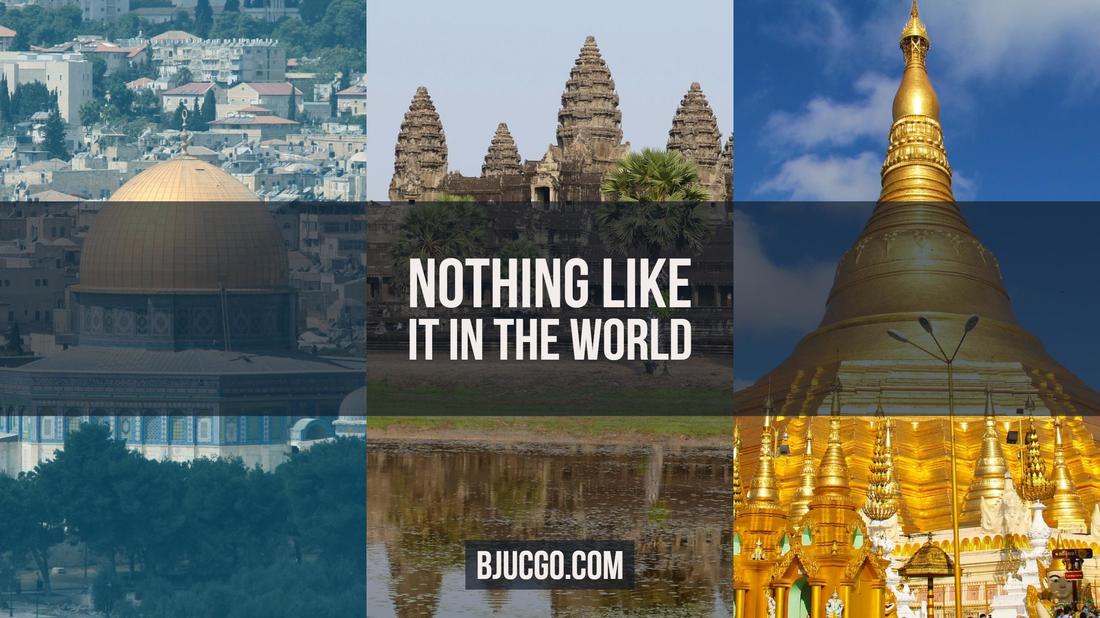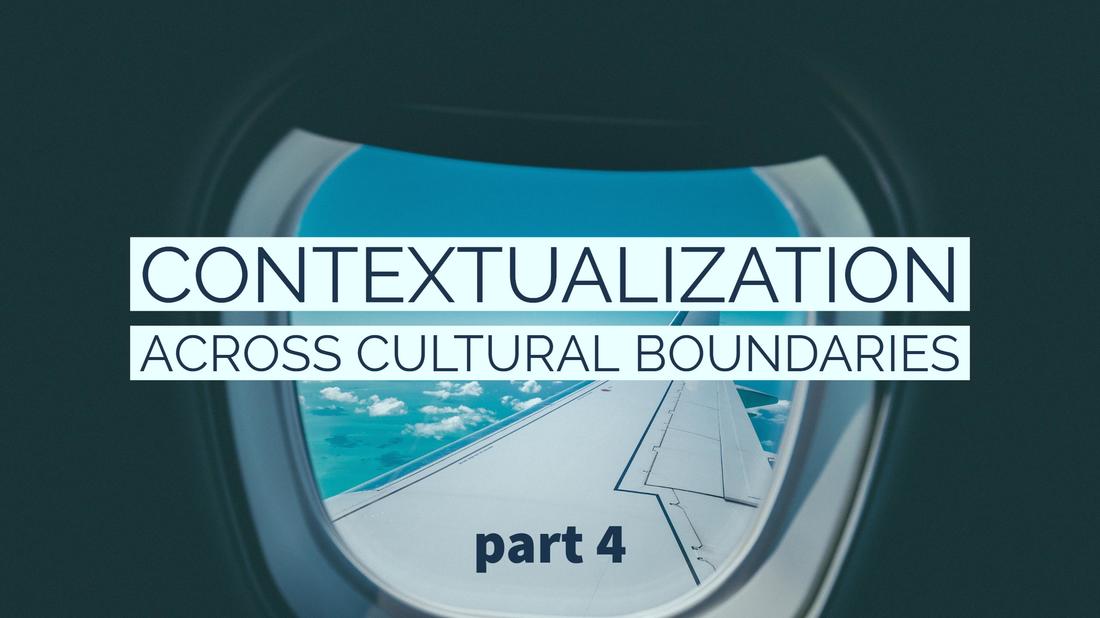Matthew Weathers, Student Leadership Coordinator你好吗?你是美国人吗? Confused yet? When I landed in China a few months after I graduated from Bob Jones University the only word I knew in Chinese was “Hello” (你好). I learned hundreds of words over the next few years as I began to scratch the surface of the incredible Chinese language. Though the language was very difficult, Chinese friends patiently taught me how to communicate and adjust to their culture. They took me around the city, invited me to meals, and even taught me how to make dumplings. They welcomed me—a foreigner—into their lives, and I am forever grateful.
There are thousands of foreigners in our community and hundreds of international students on our campus. Why should we take the time and effort to invest in them – both on campus and in our community? Because great commandment obedience fuels great commission living. Great Commandment Obedience God calls us to love God and love others. As recipients of the Gospel message and objects of God’s amazing grace and love, our response must be love for God and others. We love because He first loved us. We forgive because He has forgiven us. We serve because Jesus came to serve. We are patient because God is patient with us. The international community is an incredible group. They speak different languages, eat different (and often better) foods, and wear different clothes. But different is not wrong. As a foreigner in China, I was the different one, yet I was loved as a human rather than shunned as a foreigner. We in America can joyfully reflect God’s love as we embrace those from other countries. We are commanded to love God and love others, and our obedience to the great commandment fuels our effectiveness in great commission living. Great Commission Living God calls us to make disciples of all nations. As recipients of the Gospel message, we are privileged to proclaim the good news with our words and our lives to everyone. We are making disciples as we evangelize the lost. We are making disciples as we edify believers. We are fulfilling the great commission as we share the Gospel message to those around us, including those from other countries that God has graciously brought to our doorstep. We can have a massive impact on the nations by engaging with the international community here in upstate South Carolina and on our campus. Yet we are powerless to make disciples without God-empowered obedience to the great commandment. Just as my Chinese friends loved me, we can love those from around the world. The time and effort we invest into this amazing group of people will be well worth it. God is glorified when we joyfully sacrifice to serve one another in love and make disciples of all nations. Indeed, great commandment obedience fuels great commission living!
0 Comments
Coordinator of OutreachIn 2008, a group of us traveled to Myanmar. While there, we visited the mammoth Shwedagon Pagoda, the holiest Buddhist site in the nation. We stood dwarfed by the 325-ft stupa with its literal tons of gold and diamonds (worth an estimated at $3 billion USD[1]). I looked like an ant next to it. Shwedagon’s size, its antiquity, and the massive crowd constantly churning around its base impress any observant spectator. In many ways, it’s the crown jewel of Buddhist shrines.
There’s nothing like it in the world. We also traveled to Cambodia on that trip and toured the Angkor Wat complex. Cambodian emperor Suryavarman II built Angkor for the worship of the Hindu god Vishnu and today the temple remains the world’s largest religious monument.[2] A causeway three football fields in length, lined with peddlers, beggars, and tourists, leads to the central court across a massive moat.[3] Other temples stand nearby: temples like Bayon, known for its giant carved faces,[4] or the iconic Ta Prohm, its buildings all overgrown with tree roots. Few religious sites in existence can rival Angkor Wat. There’s nothing like it in the world. Two years after that trip, I visited the Dome of the Rock. Dominating Jerusalem’s skyline, it ranks as one of the holiest sites of Islam. The unforgettable call to prayer that sounds five times a day there (and throughout the Muslim world), the seriousness with which the adherents engage in worship, and the visual splendor of the golden dome and azure walls all combine to deeply impact any visitor with his eyes and ears open. It’s grand. It’s architecturally beautiful. There’s nothing like it in the world. These locations testify to an enormity and weight of the religions they represent. They amaze us and can leave us asking, What does Christianity have to rival Shwedagon, Angkor, or the Dome of the Rock? Do you ever wonder that? You probably have if you’ve lain in bed at night with the sound of Hindu festival drums pulsing through your open window, testifying to the power of a religion that claims 850 million adherents. Or if you’ve awakened in an African village to the Muslim call to prayer and felt very small and helpless before a religion that holds 1.6 billion in its grip. What is Christianity’s answer to the show-of-force made by the other religions of the world? How can we tell the world that, besides Jesus, “there is none other name under heaven, given among men” by which they can be saved?[5] What is our answer to religions with more adherents, more assets, and what often appears to be more fervor and zeal? Evangelical Christianity has no edifices like Shwedagon. It has no rituals that a billion people practice daily like Islam’s salat (prayer). What is our answer? The Resurrection. The resurrection is Christianity’s answer to the religions of the world. It was God’s answer to the raging nations that crucified the Lord of glory in exact fulfillment of His divine decree. It was Heaven’s answer to the Power of darkness that thought it had dealt the coup de grace to Immanuel that dark Friday afternoon. It was the Father’s answer to the Son’s unflinching obedience unto death, even the death of the cross. And it’s our answer today. Consider three things the resurrection proclaims to the religions of the world. 1.Our Christ is better. When Jesus emerged from His tomb early on a Sunday morning two thousand years ago, He demonstrated His authority over death. “No one,” He had said, “taketh [my life] from me….I have power to lay it down, and…to take it again.”[6] That’s exactly what He did. On that day, God demonstrated Jesus’ identity as the Divine Son: He was “declared to be the Son of God with power…by the resurrection.”[7] And according to Paul’s sermon on Mars Hill, the resurrection proved God had ordained Jesus as the judge of all the earth.[8] Every member of every religion from every nation in every age will stand at His bar and confess His identify one day. Death’s Conqueror, Son of God, Judge of all the earth: this is Jesus Christ. Easter proclaims that He is better than any leader of any other religion. Religions claim to be different paths up the mountain to God, but Christianity is God leaving the mountain and pitching His tent among us. The One who hung on the cross was actually God. The resurrection proves that. 2.Our life is fuller. Jesus said, “I am come that they might have life, and that they might have it more abundantly.”[9] He can give that life because of His authority over death. Our lives aren’t full because of blessings like clothes, health, money, or even freedom from sorrow and pain. They’re full because they’re anchored in the life of the One who cannot die. The New Testament ties many spiritual blessings to the resurrection.
When we tell the nations about our faith, we offer a life that is better than anything they could find in this world. Forgiveness is real! New life is a present experience! And sin loses its grip because of the resurrection. Let the world keep its rituals, temples, and systems. Easter proclaims that life is fuller for Christians. 3.Our hope is firmer. Our full life includes a firm hope in a coming life that will be even better. If this weren’t true, we would have nothing to offer the nations. Paul himself said, “If in this life only we have hope in Christ, we are of all men most miserable.”[10] Our faith is not a crutch to get us through this life. In fact, Christians’ faith is more often a cross – an instrument of their deaths in this life. Yet even in the face of death we have firm hope that reaches far beyond the grave. Paul writes, “If the Spirit of him that raised up Jesus from the dead dwell in you, he that raised up Christ from the dead shall also quicken your mortal bodies.”[11] Our full lives here portend fuller lives hereafter. The glory of Christian hope is that we will experience what Jesus accomplished in resurrection. No karma; no wondering whether we’ll make it. Glorious, powerful, certain resurrection. There’s nothing like it in the world. [1] http://www.mmtimes.com/index.php/lifestyle/10135-their-weight-in-gold-how-material-wealth-creates-spiritual-energy-in-some-of-the-world-s-costliest-holy-places.html [2] https://en.wikipedia.org/wiki/Angkor_Wat [3] https://en.wikipedia.org/wiki/Angkor_Wat [4] https://en.wikipedia.org/wiki/Bayon [5] Acts 4:12 [6] John 10:18 [7] Rom 1:4. There is scholarly discussion on the phrase “with power” that is beyond the scope of this post, but whether the phrase modifies “Son of God” or “declared,” this verse still demonstrates that God (re)declared Christ’s Sonship at the resurrection. [8] Acts 17:30-31 [9] John 10:10 [10] 1 Cor 15:19 [11] Rom 8:11 Dr. Ted Miller, SOR FacultyThis series has attempted to provide a general framework for how God wants us to interact with what a culture accepts or promotes as “normal,” with the goal of understanding how we should contextualize the Gospel in our own culture, as well as others.
As Christians, we recognize that any culture can contain elements that reflect man’s creative goodness (a reflection of God’s image), as well as elements that reflect man’s sinfulness. Although God had established Israel in the Old Testament with a national and cultural identity for the purpose of establishing the worship of himself alone, He apparently intends the church to exist across national and cultural boundaries. Nevertheless, idolatry still posed a great spiritual danger to us (and continues to provoke God to jealousy), and it is here that Paul’s discussion in I Corinthians 8-10 may be helpful in guiding our interaction within various cultures. Before he discusses the issue of meat offered to idols (starting in 8:1), Paul addresses reports regarding fornication by believers (1 Cor. 5:1+). Some in pagan culture encouraged unbridled sexual expression (i.e. fornication), and others regarded all sexual activity as being innately wrong, due to its being connected with the physical world—which some Gnostics (among others) regarded as inherently evil (cf. 1 Tim. 4:3a). The former was certainly dominant in Corinthian culture, but Paul navigates between these two errors, unequivocally condemning sexual activity outside of marriage (1 Cor. 5:1-6:20), while at the same time affirming the divinely-ordained good of sexual activity within marriage (1 Cor. 7:1-40). Paul thus affirms the goodness of the divinely-created order, while condemning its various perversions. When Paul turns to the topic of meat offered to idols, he follows a similar (dual) train of thought. The meat itself is part of God’s created order (“The earth is the Lord’s”), but cultural idolatry—under the guidance of demons—can “weaponize” (in a spiritually harmful sense) an activity as morally innocuous as consuming a piece of meat. When pagans within idolatrous cultures repent and turn in faith to the true and living God, they avoid (often instinctively) many of the symbols of idolatry, even though they explicitly acknowledge that the god(s) they worshipped never existed at all, and that there may not be anything inherently immoral with the object or the activity itself. And in such cultures, dealing with idolatry is simpler in at least one sense; false gods with names are more easily identifiable. For Christians in cultures where Satan is primarily using cultural atheism, the task is much more difficult: how does one avoid unnamed false gods, let alone identify what cultural objects and actions would be used to encourage people to follow them instead of the one true God? With these ideas in mind, I would like to close this series by proposing some likely principles and that govern the freedoms we have—and do not have—as we communicate the Gospel cross-culturally.
|
*If RSS feed is not working for you, please add it to your app or software manually by adding this url:
www.bjucgo.com/blog/feed The CGO BlogWritten by the CGO staff, with guest posts from students and other faculty/staff at BJU to provide thought leadership for missions in a new millennium. Categories
All
Archives
April 2022
|




 RSS Feed
RSS Feed
